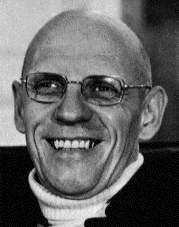The Birth of the Clinic (1963)
Foucault received higher degrees in both philosophy and psycho-pathology.
In Madness and Civilization and The Birth of the Clinic, he
offers one of the major criticisms of modern psychiatry.
In many ancient societies, the mad lead a life of troubled wandering. Some
like Van Gough or Nietzsche made fascinating contributions to the world.
But in the 19th century, he contends, "mental illness" was invented and
a "scientific" discourse evolved around it. Consequently, the mad were
confined and tormented by the moralizing psychiatrist.
Discipline and Punish (1975)
In the last few hundred years, the treatment of the criminal changed from
the "spectacle of the scaffold" to the modern system of confinement and
reform.
As with the treatment of mental illness, Foucault situates the evolution
of criminology in the modern society -- a society in which the individual
is increasingly judged, shepherded and observed by authorities.
An important concept is the Panopticon, a system (be it prison
building or computer network) in which people are constantly
immersed in a hierarchy of surveillance.
The History of Sexuality (1976, 1984)
"At the beginning of the seventeenth century, a certain frankness was
still common, it would seem. Sexual practices had little need of
secrecy; words were said without undue reticence, and things were
done without too much concealment..."
The conventional wisdom has been that the 19th century was the beginning of
a modern age of sexual repression and secrecy. Foucault argues that the
opposite is true -- never before has sexuality been more discussed and
"scientifically" classified.
Foucault criticizes this trend toward "medicalization" of human behavior
and the "medical power" of experts. In particular he discusses:
- The hysterization of women's bodies --
psychiatry did a number on women, creating the myth of the "nervous women",
sometimes interpreting the results of sexual abuse as symptoms of
neurosis.
- The pedagogization of children's sex --
two centuries of war against masturbation typified the modern, morbid
fascination with children and the sexual development of young people.
The surveillance of children mirrors modern society's surveillance of all
individuals.
- The psychiatrization of perverse pleasure --
the sexual instinct was isolated as a separate biological instinct,
assumed to be strictly intended for procreation. A clinical analysis
was made of all the forms of anomalies, norms of behavior defined,
and corrective technology sought for all these anomalies.
|

